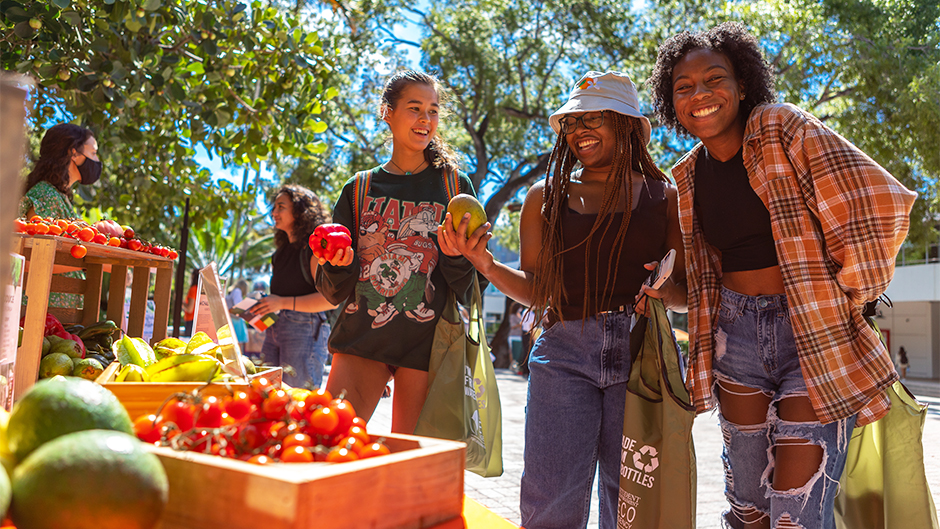Every year, World Food Day is celebrated internationally on Oct. 16 to commemorate the founding of the Food and Agriculture Organization as a United Nations agency in 1945.
The Office of Civic and Community Engagement (CCE), in collaboration with several other departments at the University of Miami, including the Butler Center for Service and Leadership, Office of Sustainability, the Abess Center for Ecosystem Science and Policy, and the Student Government ECO Agency, celebrated the 76th anniversary of World Food Day on Oct. 18 and 19 with in-person and online events.
The University’s theme of this year’s World Food Day, “The future of food is in our hands,” focused on how individual actions and choices contribute to the “agri-food system,” or the overall journey of food from farm to table. It also incorporates animal rearing and forestry that comprise livelihoods and all the people, as well as activities, investments, and choices that play a role in getting us these goods and agricultural products.
The University’s overall goal of hosting the two days of events was to bring awareness to and support sustainable food systems by increasing awareness of the way we source, cook, and eat.
“As we emerge from the pandemic, I have reflected on the importance of World Food Day to our campus and the surrounding community,” said Marisa Hightower, associate director of CCE. “Since 2011, our office has hosted World Food Day to increase awareness to faculty, students, staff, and the community on food justice and sustainability issues. These events provide an opportunity for our community to understand these issues and how organizations, locally, nationally, and globally, are working to address them.”
As part of the programming on Monday, a virtual panel on “Agri-food systems for healthy communities’’ was moderated by Imelda Moise, associate professor of geography. Panelists included local food experts Thi Squire, founder of the Grow2Heal Garden at Homestead Hospital; Roger Horner, executive director of Urban GreenWorks; Franziska Alesso-Bendisch, United Nations Association USA Miami board member and founder of Better Food Partners. The panel addressed equitable access to health and sustainable food and its impact on health.
“In my opinion, the discussion about food security has evolved over the past three years as it now involves topics such as community nutrition, resilience against disruptions, and shocks,” said Alesso-Bendisch, whose work focuses mostly on systematic change. “We don’t only talk about eradicating hunger, reaching zero hunger, or no food insecurity, but we are also in the same breath talking about the opportunities and challenges of current food systems related to climate change related risks, to inequalities, and all the other 17 sustainable development goals.”
On Tuesday, campus and community partners presented the Fair Food Fair on the University Center Rock Plaza, a free event that promoted healthy eating, urban farming, community gardens, and more. Later that day, biomedical graduate and medical students at the Miller School of Medicine Herb and Food Garden hosted a tour of the area and attendees participated in a planting and beautifying session to celebrate sustainable food systems and their therapeutic power.
Gemma Luther, a senior from San Diego, California, studying marine science and biology, is the current director of outreach for Student Government’s ECO Agency. She was present at Tuesday’s fair giving out bucket hats and engaging with community members to increase their agency’s mission of sustainable living and eating.
“We know that not everyone can eat plant-based, but we really want to encourage everyone to be aware of what food they are buying and where it comes from and if its sustainable or not,” said Luther. “We made 30 meal kits—15 dorm-style and 15 apartment-style—that students can sign up for that are vegan/vegetarian to show people how easy it is to eat this way.”

